Czechs known for high living standard and high income
The following article was contributed by the Embassy of the Czech Republic in Seoul to The Korea Post for publication on the occasion of the visit of the government delegation of the Czech Republic headed by Prime Minister Bohuslav Sobotka to Korea on Feb. 24-27, 2015.--Ed.
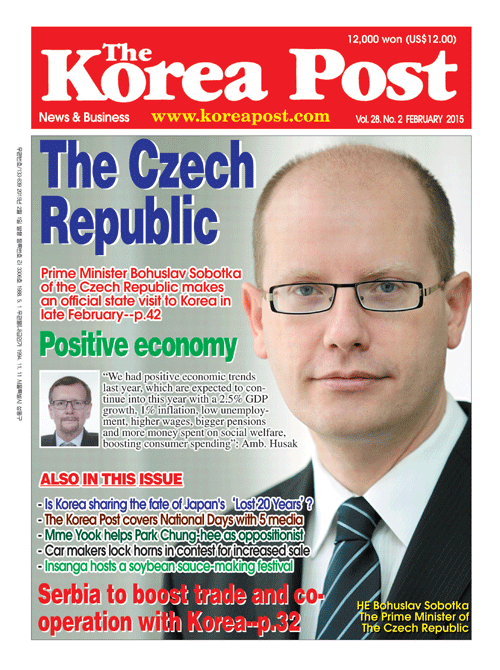
Dear readers of The Korea Post,
The Czech Republic is a dynamic state in Central Europe, with an advanced high income economy and high living standards. It includes the historical territories of Bohemia, Moravia and Czech Silesia and it is the successor of former Czechoslovakia. Modern, independent Czechoslovakian state was founded in 1918, the moment when Countries of the Czech Crown and Slovakia ceased to be part of the Austro-Hungarian Empire and became a Republic. Since then Czech people have lived in a political system based on a Republic. It is actually a short part of our thousands years of history, in which a Czech state had existed practically on the same territory.
Czechoslovakia was peacefully dissolved into the Czech Republic and Slovakia in 1993. Today both countries keep friendly relations and they are reliable partners within the context of the European integration process.
A new beginning and an important turning point in the current history came in November 1989; it was the moment of the fall of communism. Last year we were commemorating the 25th anniversary of the Velvet Revolution--a bloodless movement in Czechoslovakia that saw the overthrow of the communist regime in 1989. It was 25 years ago when crowds of people, especially students and dissidents marched to the Wenceslas Square in the center of Prague and they expressed their discontent with the rule of the Communist party.
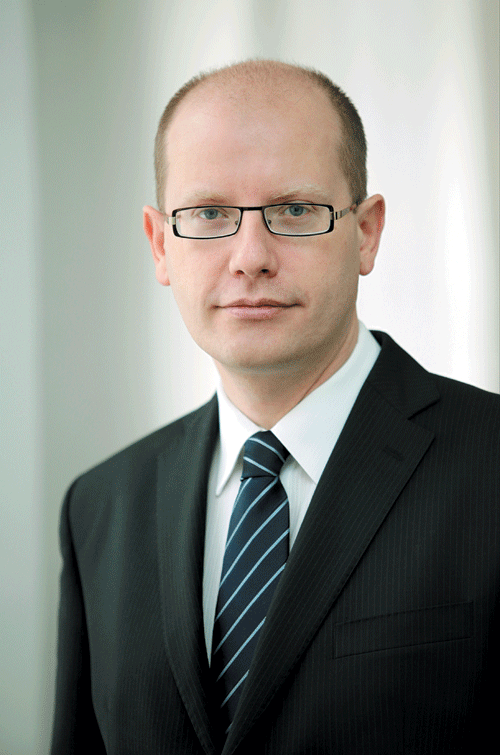
Since then, the Czech Republic has undergone the transformation of the political and economic system. Today it is a state characterized by free market, civil society and respect for the law, human rights and environmental issues. The Czech Republic is an active and responsible member of the OECD, OSCE, the European Union and NATO. It contributes not only to solving particular items of the current EU agenda, but also to the extending and deepening of the whole concept of the European integration project. The Czech Republic is also active member of the Visegrad Group which reflects the efforts of the countries of the Central Europe to work together in many fields of common interests within the all-European context. The UN ranks the Czech Republic as the eleventh-most peaceful country.
Today Republic of Korea is one of our key partners in Asia. There is an intensive cooperation on the level of political dialogue, including parliamentarian diplomacy. Minister of Foreign Affairs of the Republic of Korea H.E. Yun Byung-se visited the Czech Republic July 15-16, 2014; the delegation of the Korean National Assembly headed by Vice-President Hon. Lee Byung-suk held fruitful talks with Czech counterparts in April 2014. In September a reciprocal parliamentary visit of the Defense Committee delegation to Korea took place. It was headed by the First Vice-President of the Chamber of Deputies of the Czech Parliament Hon. Jaroslava Jermanova. The Senate delegation of the Committee on National Economy, Agriculture and Transport of the Senate headed by the Vice-President Hon. Zdenek Skromach visited Korea in October last year.
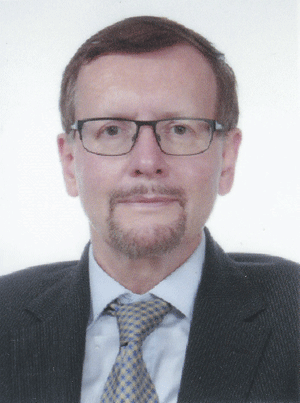
We very much appreciate the dynamics in Czech-Korean economic cooperation as well. The Republic of Korea has become a very important trade partner and investor. The bilateral economic and trade cooperation is gaining momentum and benefits both economies. Republic of Korea is currently the fourth-biggest investor in the Czech economy in terms of job creation, which unambiguously demonstrates South Korea’s impact on our economy. Our trade exchange is still increasing on both sides and this trend is very encouraging.
The Czech Republic and the Republic of Korea share common interests in culture and education as well. There is a long tradition in learning Korean language at Charles University in Prague, where first courses of Korean language were taught since 1944. At that time it was the only place in Europe teaching Korean (besides Korean studies taught in Russia). In February 2013 the Czech Cultural Center in Seoul was opened as the only Central European cultural institute in Korea. There is a fruitful cooperation and exchange of students between several Czech and Korean universities too.
This year we are commemorating 25th anniversary of the establishment of the diplomatic relations between the Czech Republic and the Republic of Korea. In connection with this anniversary there is the exhibition "Story of Bohemian Glass" at National Museum in Seoul which is introducing the history of glass production in Bohemia. Namseoul University Art Gallery in Seoul will present photo exhibition about Prague Castle and works of painter Irena Stanislavova in April, in summer series of concerts in Seoul Art Center will introduce Czech classical music and Korea Foundation will host exhibition of artistic photos "Beauty of the Czech Republic".
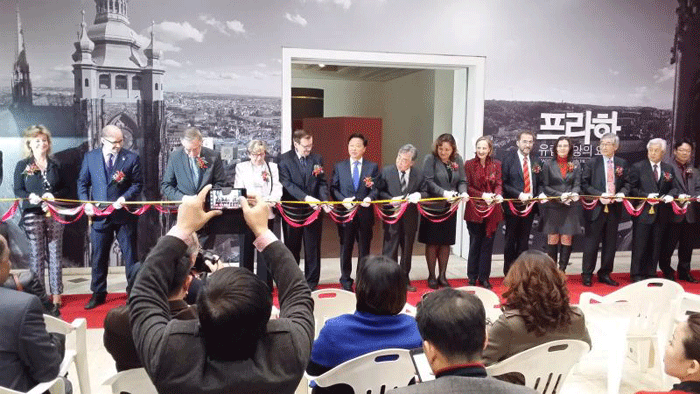
Coming visit of the Prime Minister of the Czech Republic to the Republic of Korea is the latest confirmation of our excellent bilateral relations. It will also support and strengthen our common desire--to cooperate for the common benefit of our Republics.
Tomas Husak
Ambassador of the Czech Republic
H.E. Mr. Bohuslav Sobotka, Prime Minister of the Czech Republic:
The Czech Republic’s government delegation will be headed by Prime Minister Bohuslav Sobotka. He was named Prime Minister in January 2014 as the leader of the Czech Social Democratic Party and the winner of the 2013 Parliamentary elections. Since 1996, Bohuslav Sobotka has been repeatedly elected to the Chamber of Deputies of the CR, and in 2002-2006 were the Minister of Finance and Deputy Prime Minister of the Czech Republic.
Prime Minister Bohuslav Sobotka emphasizes active foreign policy and economic diplomacy. Proof of this is the large number of foreign delegations that have been welcomed at the Office of the Government of the Czech Republic, as well as a number of trips abroad that he has embarked upon during the 12 months he has been in office.
As in many other countries, the Czech Republic’s economy has been affected by the global economic crisis. The main priorities of Bohuslav Sobotka’s government include renewal of economic growth, new investments, and job creation. The key to a good economic and social situation in the Czech Republic lies primarily in investment in manufacturing companies, support for business, a deeper linkage between Czech foreign business, and related increasing employment, plus maintaining social cohesion through intensive dialogue with employers and unions.
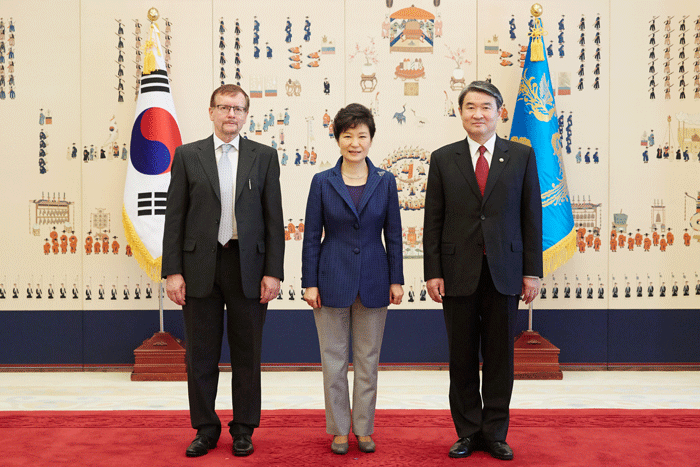
This is one of the reasons why the Prime Minister considers his visit to the Republic of Korea to be among his key trips within the scope of the Czech government’s priorities. His work programme indicates his priorities for the trip to South Korea, accompanied by a large business delegation and representatives of scientific institutions.
The Czech Republic currently has several large strategic industrial zones for foreign investors. The Republic of Korea has long been an important investor in the Czech Republic, in third place in terms of the amount of finances invested in terms of utilized investment incentives. The Czech Republic provided the Republic of Korea with investment incentives for a total of 16 projects for a total investment volume of approximately 67 billion CZK (2.8 trillion Won). Thanks to these incentives, up to 9900 new jobs are to be created. The projects in question are primarily in the vehicle-manufacturing sector.
Bohuslav Sobotka’s government is aware of the Republic of Korea’s potential as an investor. Proof of this is that last year, it signed an agreement on the third largest investment in the history of the Czech Republic, being built by the South Korean company Nexen. The investment with a total worth of 23 billion CZK (approx. 95 billion Won) will take place in the Triangle industrial zone in the Central Bohemian Region. Here, Nexen will build a tire manufacturing plant.
A second such example is the broadening of successful cooperation with Hyundai Mobis, which as active in the Nosovice industrial zone, among others. On 29 July 2014, a new significant investment project was signed between the Czech Republic and this company. A manufacturing plant for lighting systems will be built in the Ostrava--Mosnov industrial zone in the Moravian-Silesian Region. The planned investment amounts to 4 billion CZK, approx. 165 Billion Won). This new plant will supply Hyundai and KIA auto manufacturing plants.
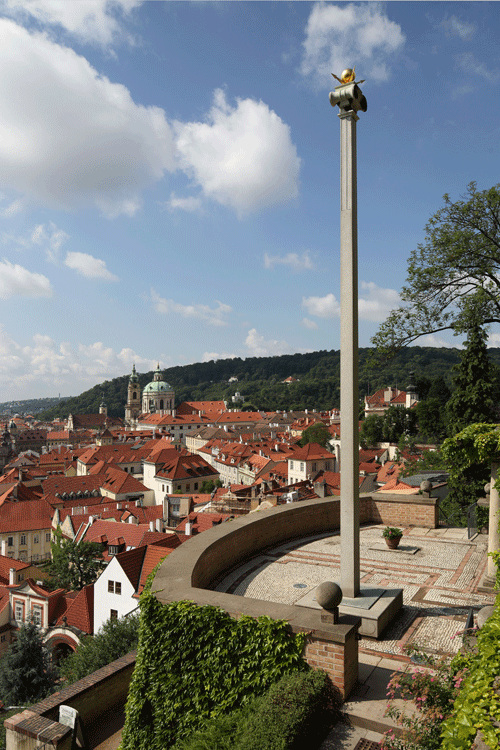
Czech Economy:
The positive economic trends of the Czech economy and economic recovery established in the year 2014 are expected to continue in 2015 in the form of stable economic growth, low inflation rate and dropping unemployment. According to preliminary figures, GDP would stay around 2.4 % in 2014 and the economy grow will reach 2.7 % in 2015. Growth will be driven by industrial production, exports and exclusively by domestic demand. Higher wages, bigger pensions and more money spent on social welfare is expected to boost consumer spending. The economy will benefit also from the government investments into large infrastructure projects in the construction industry, which will create thousands of new jobs. The unemployment could slightly drop to about 6.5 %. Consumer prices should grow very slowly also this year, especially due to the slump in the price of oil. The average inflation rate could thus decrease further to 0.2 % in 2015.
Czech Industry:
Czech industrial production has a very long tradition. Industry is still very important to the economy of the Czech Republic. As regard the percentage share, industry stands at 35 %. The share of 62 % belongs to services and about 3 % to agriculture. Over 40 % of all economically active citizens work in the industrial sector. The main pillars of the Czech industry are engineering and machine engineering, chemistry and foodstuff production, followed by the energy sector, civil engineering and consumer industry. The engineering industry is ranked among the most traditional industrial branches in the Czech Republic. Automotive industry, which employs over 150 thousand people, is a very strong export branch and one of the most important parts of the Czech industry. Czech Republic hosts one of the highest concentrations of automotive-related manufacturing and design activity in the world. While the country has the capacity and resources to accommodate three major carmakers--Skoda Auto (Volkswagen group), Hyundai Motor Manufacturing Czech and TPCA (Toyota--Peugeot--Citroen joint venture)--and holds excellent business opportunities for suppliers, the Czech Republic is poised to consolidate its position as one of the leading European centers for automotive-related design and R&D activity. For example, in 2014 the biggest car maker Skoda Auto produced more than 1 million cars, Hyundai Motor Manufacturing Czech over 300 thousands passenger cars and TPCA around 200 thousands cars.
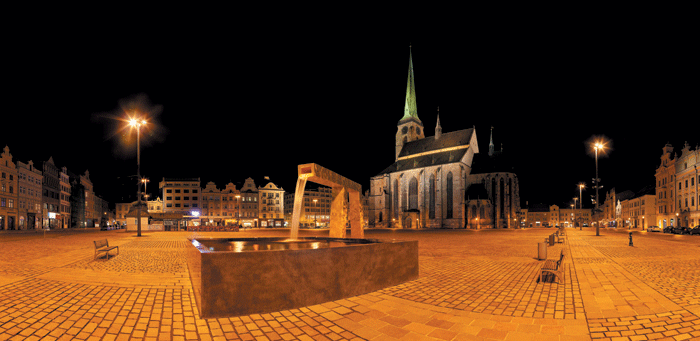
Foreign Trade between Czech Republic and Republic of Korea:
Czech Republic like Korea is a country with limited natural resources and dependency on international trade and cooperation. Therefore, the Czech government defined the strategic framework for pro-export policy. The 2012-2020 Export Strategy of the Czech Republic summarizes the general vision of pro-export activities by the state, their objectives as well as the measures to be taken in order to achieve these objectives. Also, the Strategy fully supports the approach chosen under the 2012-2020 International Competitiveness Strategy for the Czech Republic and, accordingly, declares to help the Czech Republic to become one of the 20 most competitive countries in the world by 2020. The accomplishment of the measures proposed in the 2012-2020 International Competitiveness Strategy for the Czech Republic is seen as an essential and necessary prerequisite for the success of projects in the scope of export and internationalization support.
The Czech Republic had the highest foreign trade balance in 2014 and according to preliminary figures the Czech exports were 13 % higher than in the year 2013 (comparison in Czech crown). However, the outlooks for foreign trade on the other hand are not as optimistic as expected due to the economic slow-down of the Eurozone and the impact of the recession in Russia. An important factor in the year 2015 would be the European central bank decision concerning the threat of deflation in the Eurozone.
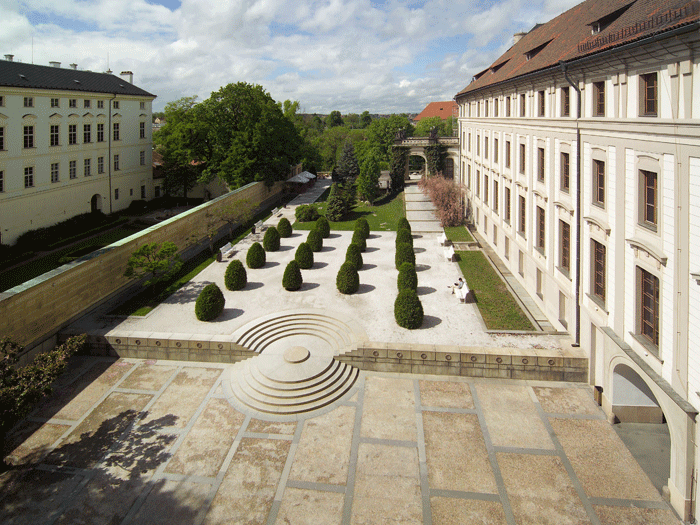
In line with the historical tradition, the Czech Republic’s ambition is to continue to specialize in the production of technological and investment units. A high degree of inventiveness and top professional solutions are other advantages. The current Czech government is well aware of the strengths of the Czech economy, and therefore has been taking steps to clearly and efficiently support sectors and fields, in which Czechs excel, offer high quality, a unique added value and competitiveness.
It is interesting to see that in the Czech and Korean export portfolio have so many similar items and commodities, which are only different in details, execution, trademarks etc. It is well known that the most important Czech export items to Korea are not only its famous beer, but also steam turbines, measuring equipment, tool machinery, pumps, electrical equipment, optical devices, transport means and their components, foodstuff, sports equipment, toys and glass production. On the other hand, Korea exports to the Czech Republic measuring equipment, tool machinery, transport means and their components, electrical equipment and optical devices. It means that the Czech production is complimentary and bilateral trade exchange support industrial strength of both countries.
Despite the excellent results of Czech Korean mutual trade exchange, which increased more than 17 times since the year 2001, there is still a space for bilateral trade and cooperation not only in mentioned sectors, but also for example in chemicals and pharmaceuticals, information and communication technologies, energy sector, medical equipment and wood processing industry. Also, there is very good opportunity in the field of research and development, where are number of cooperation already in process.
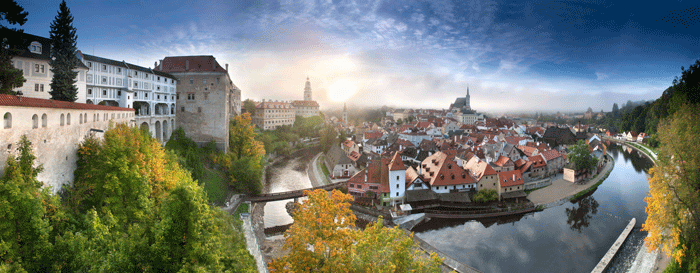
The economic results of the Czech Republic clearly show that the country has embarked on the right path. It is well known that the Czech Republic is considered as a stable and a good quality base for the development of business relations. Thanks to the clear and transparent economic and business strategy, the Czech Republic and Korea can strengthen and intensify mutually advantageous economic relations. This applies to the exports of investments, goods and services from Korea to the Czech Republic as well as to the Czech exports to Korea. The Czech government creates the best possible framework conditions for that.
Czechinvest office in Seoul:
On the occasion of the visit of Prime Minister of the Czech Republic to Republic of Korea Czechinvest agency is going to open its office in Seoul. Since Czechinvest is governmental organization, the office will be located at the Czech Embassy.
The Czech Republic’s industrial tradition dates back to the nineteenth century. The outstanding Czech manufacturing know-how of today is the direct result of decades of experience, hard work and dynamic development. A natural and valuable asset of the Czech Republic is its strategic location in the centre of Europe, providing very good access to both Eastern and Western European markets. Through its industrial development, the country is also strongly tied to neighbouring Germany, for which it comprises a strong supplier base. An added advantage is the Czech Republic’s membership in the European Union.
The automotive, mechanical-engineering, electronics, metallurgy and steelmaking sectors comprise the most important aspect of contemporary Czech industry. Czech glass and beer are also well known in the world. In the past twenty-five years the services sector has grown substantially in the Czech Republic. Some Czech IT firms rank among the world’s elite or are leaders in Central and Eastern Europe. Foreign companies find in the Czech Republic an ideal environment for shared-services, IT and software-development centres.
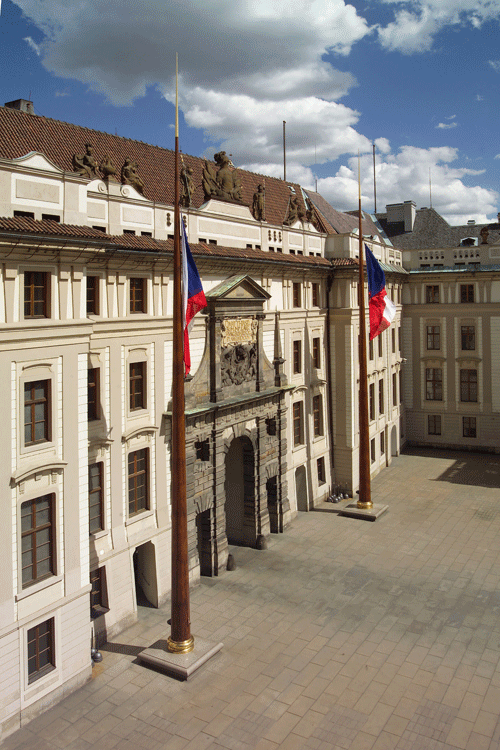
Following a brief disruption connected with the global economic crisis, the Czech government has placed support for investments back among its main priorities. CzechInvest, the Investment and Business Development Agency of the Czech Republic, is implementing the government’s policy in the regard through implementation of specific measures. The agency’s main activities include provision of all necessary information to potential investors, consultancy pertaining to current Czech legislation and administration of certain instruments of support such as investment incentives and selected European Union structural funds. CzechInvest also provides investors with assistance in dealing with government authorities and helps them to engage with universities and research institutes. Thanks to its unique databases, it is able to give investors comprehensive information on suitable business properties, industrial zones and brownfields, as well as possible suppliers.
CzechInvest is the exclusive organisation authorised to accept applications for investment incentives. Korea is currently the fourth most successful country in terms of receiving investment incentives in the Czech Republic. Since July 2014, the intensity of investment incentives has changed due to the requirement of common European legislation. In response to this development, however, the Czech government has drafted an amendment to the Act on Investment Incentives with the purpose of offsetting the reduction in total aid by means of other instruments.
CzechInvest’s contact with investors does not come to an end once investments have been implemented. Through its AfterCare services, the agency helps investors to create suitable conditions for their further development in the Czech Republic. These services have been used by, for example, Doosan Skoda Power, which invested in a research centre. All of CzechInvest’s services are provided free of charge.
Between 2005 and the first quarter of 2014, CzechInvest helped to mediate 24 investment projects of Korean firms. One of the most significant of these was Hyundai Motor Company’s investment in Nosovice in 2006, which prompted the entry of a number of Korean suppliers, such as Sungwoo Hitech, Sejong and Hanwha that are now operating in proximity to the Hyundai plant in the Moravia-Silesia region.
Korean investors particularly value not only the Czech Republic’s longstanding industrial tradition and skilled workforce, but also the outstanding conditions that the country provides for Korean workers, as well as the growing awareness of Korea among the Czech people and the rising cultural affinity between the two countries.
Czech Tourism office, Seoul:
CzechTourism is Czech government agency, which recently opened its office in Seoul in order to support Korean tourists travelling to the Czech Republic. More than 175,000 Korean tourists visited Czech Republic in last year 2014. Fueled by 8 direct flights between Prague and Incheon (operated by Koreanair and Czech Airlines), the closer collaboration of both countries and the work of Seoul office of CzechTourism, the year result could overcome 200 thousand in near future, sad Mr. Michal Prochazka, Director of Czechtourism Seoul Office.
Western Europe remains the first European choice for travelers. But Czech Republic and Prague--it is the most popular destination on Eastern Europe tour. Korean mostly see it as a country of fairy tales, preserved history and culture, economy style travelling. No wonder it has become a major destination on the East European itinerary of 3 countries packages, proposed typically by various Korean Tour operators.
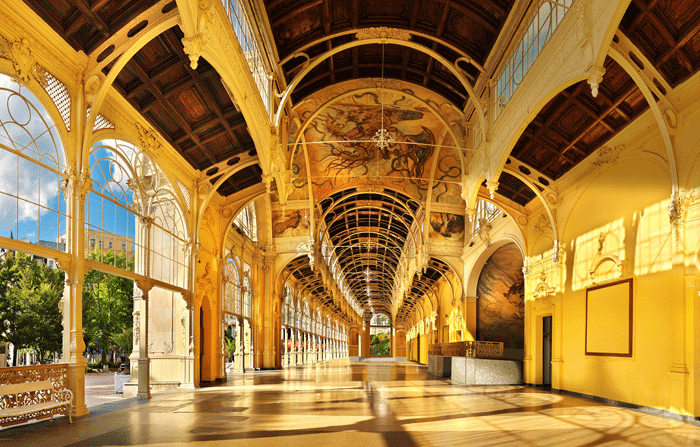
The classic main stops remain Prague and Cesky Krumlov but some 20 travel products have been newly enriched with new destination sites like Karlovy Vary, Loket, Kutna Hora, chateaufort Karlstejn etc.--following the CzechTourism Seoul office opening in 2013 and launching the campaign Czech Republic Land of Stories.
Generally, the high season of Korea travel market is during Lunar’s new year holiday, Summer Holiday, Chuseok holiday. Since its opening CzechTourism Seoul office has organized 16 press and fan trip during a period of one year and a half--resulting in introducing 25 new package product including new program such as Mucha museum, Lobkowicz Palace, The national gallery, Pilsner Urquell Brewery and others… were introduced to Korean travel market.
As a CzechTourism authority for Korea we can see two clear trends happening. The group package travelling to Europe becomes accessible and popular for wider population in Korea with the increase of cheaper products. On the other hand the number of young travelers in 20s and 30s prefer to travel on their own and tend to choose more individual and developed program outside the stereotype packages.
Prague has been becoming a popular destination for honeymooners but the romantic positioning of Czech destinations helps to develop also other products--since the main targets are Korean family mothers in 50’s and young office workers and students from 20-30’s.
For the 2015, we see the CzechTourism promotion should be focusing on destination storytelling and social networks activities-- while working especially with the visuality of Prague and Czech Republic. In Korea we claims that Prague is the most photogenic city in Europe convening very well to Korean love for photographing. Let travelers share their photos by themselves and spread good news about Prague beauty around.
But the great prospect for CzechTourism activities lies in a partnership co-marketing either with commercial companies or with culture events. For example, following the success of Pilsner Urquell in Korea, the City of Przen with its Pilsner Beer Tour and the Plzen the Capital of European Culture 2015 Project could become another popular Czech destination.
You can find Czechtourism office on 4th Floor, 59, Dongmak-ro 7-gil, Mapo-gu, Seoul, Korea or visit them on internet pages www. czechtourism.com.
Czech Centre Seoul:
Czech Centers are a contributory organization of the Ministry of Foreign Affairs of the Czech Republic, established to promote the Czech Republic abroad. The Czech Centers network consists of the Czech Centers Headquarters in Prague, 22 branches abroad, and the Czech Centre Prague. These centers interconnect presentations in the cultural arena and support of external economic relations and tourism. They provide informational services about the Czech Republic.
After British Council, Goethe-Institute, French Institute and Italian Institute Czech Centre Seoul represents the 5th European cultural Institute in Korea and the only one of the Central European countries.
Although established in May 2013, the Czech Centre Seoul has already shown its potential through organization or co-organization of dozens of successful events. The Czech Centre Seoul is located in the Castle Praha Building designed similarly to the Prague Astronomical Clock. It’s provided with a small gallery, where exhibitions are opened three or four times a year. So far the Centre’s mostly dealt with photographic exhibitions. It was officially opened by the photographs of a world-famous Czech artist Jan Saudek followed by the exhibition of the photographs taken by the Czech members of the Neutral Nations Supervisory Commission. These pictures depicting Korea in early 50’s commemorated the 60th anniversary of signing of armistice agreement and the Korean public had the opportunity to see them for the first time ever. The last exhibition’s been dedicated to the most significant Czech writer of the 2nd half of the 20th century Bohumil Hrabal to celebrate his 100th anniversary. In the upcoming year the Czech Centre in Seoul will focus on the contemporary Czech figural drawing. The exhibition under the title “Figurama”, which is going to be opened in few days, will introduce best works of Czech university students. It will be followed the exhibition Artelerie showing works of their professors and the exhibition presenting Czech figural painter Boris Jirku.
The comics exhibition Antonin Dvorak was realized as a part of the project Year of the Czech Music 2014 initiated by the Ministry of Culture in cooperation with the Ministry of Foreign Affairs, Ministry of Education and Ministry for Regional Development with the primary objectives of supporting projects promoting Czech music both at home and abroad. The year 2014 was a remarkable year for the Czech music, with over sixty prominent Czech composers, performers, and musical organizations celebrating anniversaries--from Antonin Dvorak, Bedrich Smetana, Leos Janacek, Bohuslav Martin, and Josef Suk to Rafael Kubelik and Milada Subrtova to the Prague Symphony Orchestra and the Janacek Philharmonic Ostrava.
Besides Renata Fucikova the Czech Centre Seoul introduced another Czech illustrator in Korea. In cooperation with the National Library for Children and Young Adults in Seoul and the Gallery for Children GUD in Prague it launched an interactive exhibition for children consisting of illustration of respected Czech artist Radek Pilar. The exhibition is running in the library till the end of this month and at the end of April it will move to the NamBook Festival on Nami Island, where two years ago the Czech Centre presented a Little Mole--a character loved by all Czech children.
In the field of education the Czech Centre mostly cooperates with the Department of the Czech and Slovakian Studies at the Hankuk University of Foreign Studies. From the last year they ‘ve been working together on the project “Ceska kavarna (Czech cafe)”, which is intended for the students of Czech language, who have the opportunity to become familiar with Czech culture in an interactive form. Moreover the Centre holds presentations on various topics concerning the Czech Republic at the request of different Korean organizations and companies.
It is the collaboration with strong partners on Korean cultural scene, which has enabled the Czech Centre to achieve many successful cultural events during not even two years of its existence. In the upcoming year the Centre aims to develop the cooperation with existing partners, establish relation with new ones and bring many other meaningful cultural events enhancing cultural exchange between Czech Republic and the Republic of Korea.

